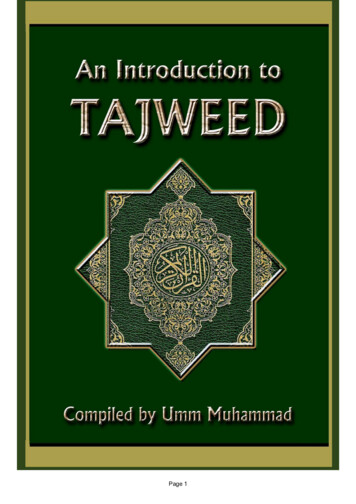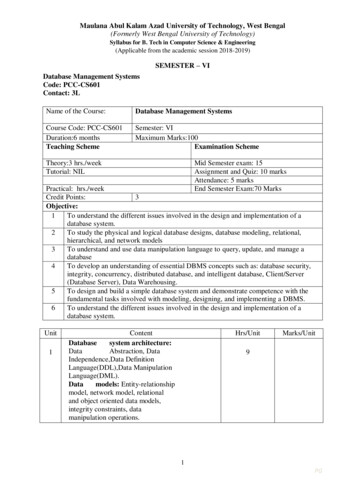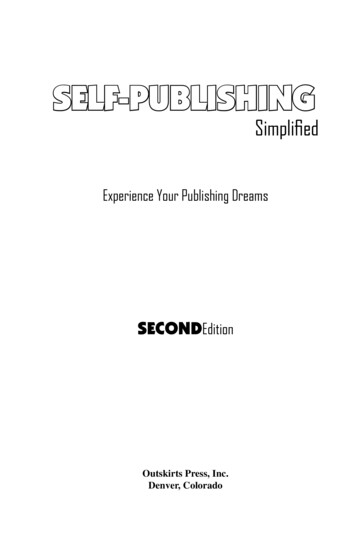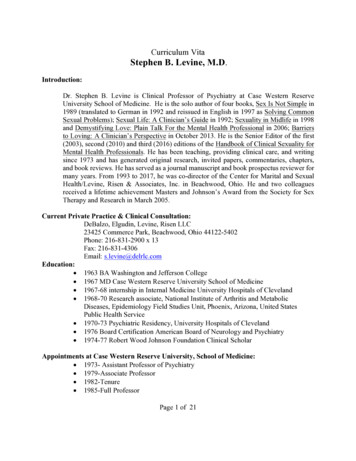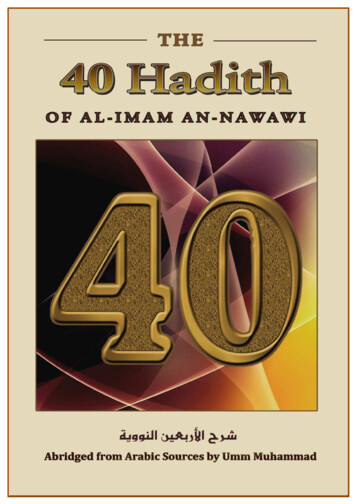
Transcription
All rights reserved. No part of this publication may be reproduced, stored in a retrieval system ortransmitted in any form or by any means – electronic, mechanical, photocopying, recording orotherwise – without written permission from the publisher. ABUL-QASIM PUBLISHING HOUSE, 1999King Fahd National Library Cataloging-in-Publication DataAn-Nawawi, Yahya bin SharafThe forty ḥadīth of al-Imām an-Nawawi: text with explanatory notes / Abridged from Arabicsources by Umm Muḥammad – Jeddah184 p., 14 x 21 cmISBN 9960-792-76-51 – Al-Ḥadīth1 – Title237.7 dc2326/20Legal Deposit no. 2326/20ISBN: 9960-792-76-5ABUL-QASIM PUBLISHING HOUSETelephone (966) 2 671-4793 – Fax (966) 2 672-5523P.O. Box 6156Jeddah 21442, Saudi ArabiaTHIS BOOK HAS BEEN PRODUCED IN COLLABORATION WITHṢAḤEEḤ INTERNATIONALProfessional Editing and Typesetting of Islamic Literature
TABLE OF CONTENTSPreface. iAl-Imām an-Nawawi . ii"And Whatever the Messenger Has Given You – Take" . ivThe Forty ḤadīthNo.SubjectPage no.1Importance of intention . 12Definition of Islām, īmān and iḥsān . 43Pillars of Islam . 84Man's development and final deeds . 105Prohibition of innovation in religion . 136Avoidance of doubtful matters . 157Religion is sincerity . 178Protection of Muslims . 199Obedience to the Prophet ( ) . 2110Limiting oneself to what is lawful . 2311Adherence to what is certain. 2512Refining the soul . 2613Consideration for others . 2814Legal execution . 2915Good character . 3216Anger . 3417Proficiency in slaughter . 3618Avoiding sins . 3719One's relationship with Allah . 3920Shame and shyness . 4221Upright conduct . 4322Religious obligations lead to Paradise. 4423Good deeds . 4524Some attributes of Allah . 4725Rewards . 5126Charities . 53
27Righteousness and wrongdoing . 5428Instruction . 5629Ways to Paradise . 5830Rights of Allah (subḥānahu wa taʽālā) . 6131Indifference to worldly things . 6332Prohibition of all harm . 6633Evidence . 6834Prohibiting wrong . 7035Social behavior . 7336Relieving a Muslim brings aid from Allah . 7737Allah's generosity . 8138Allah's anger and approval . 8539Errors overlooked by Allah . 8840Reducing worldly aspirations . 9141Faith is love of obedience. 9442Allah's capacity for forgiveness . 96
PREFACEAll praise is due to Allah (subḥānahu wa taʽālā), of whom we ask blessings andpeace upon His final prophet, Muḥammad .The collection of Forty Ḥadīth compiled by al-Imām Yaḥya bin Sharaf an-Nawawi(which actually contains 42 ḥadīths) has been widely studied in traditional Arabiccircles of learning and continues to be one of the basic subjects taught in Islamiccourses throughout the world today. This is primarily due to:1) the soundness of the collection as a whole – most of its narrations having beentaken from the two "Ṣaḥeeḥs" of al-Bukhāri and Muslim,2) the conciseness and comprehensiveness of the prophetic statements containedtherein, and3) the fact that from them are derived many of the basic principles of aqeedah andsharī ah.A translation into English of An-Nawawi's Forty Ḥadīth by Ezzeddin Ibrahim andDenys Johnson-Davies was first published in 1976 and has since then enjoyednumerous reprints. Although a faithful translation, it is limited to the text of eachḥadīth. Al-Imām an-Nawawi had himself included some explanatory annotation, andnumerous scholars subsequently contributed further explanation and commentary onAn-Nawawi's Forty in Arabic. Most of this material, however, has remained inaccessibleto those without knowledge of the language.In an attempt to fill this gap and assist more people toward an understanding ofthese ḥadīths and the religion in general, a few of the better known and acceptedexplanations by early scholars have been compiled and abridged for the benefit ofEnglish readers. The original translation of the text (matn) of the ḥadīth by Ibrahimand Johnson-Davies has been slightly altered in places for the purpose of clarificationor accuracy. Explanatory commentary is based upon that of al-Imām an-Nawawihimself, as well as the concise Sharḥ of Ibn Daqeeq al-ʽEed (d. 702 H.) and the moredetailed Jāmiʽ ul-‘Ulūm wal-Ḥikam by al-Imām Ibn Rajab (d. 795 H.).This modest work is submitted for the acceptance of Allah (subḥānahu wa taʽālā)and with hope that it will prove useful to His servants.i
AL-IMĀM AN-NAWAWIAbū Zakariyya Yaḥyā Sharaf an-Nawawi was born in the town of an-Nawā, southof Damascus, in the year of Hijrah 631, corresponding to 1233 of the Gregoriancalendar. He was encouraged from childhood by his father toward religiousscholarship, and so strong was his love for Qur’ānic studies that he refused to bedistracted by other boys urging him to play. At the age of nineteen his father tookhim to Damascus, which was then a prominent seat of learning and accommodated thebest scholars of his time.An-Nawawi recalls that for the first two years of study under his shaykh, al-Kamālal-Maghrabi, he hardly ate or slept while devoting himself to the memorization andunderstanding of volumes of fiqh, and later, under other distinguished scholars, those ofḥadīth, fundamentals of religion, Arabic language and other related specialties. Henever tired of reading and writing, allowing himself to rest only when sleep overcamehim during a limited portion of the night and then quickly awakening to continue hiswork. During this six year period he was examined daily in eleven lessons pertaining tovarious subjects.Al-Imām an-Nawawi was blessed with an exceptional memory coupled with suchinsight and understanding that enabled him to put together and assess all that he hadread at different times from various sources. Additionally, he embodied the Islamic traitsof modesty, patience and courage in support of the truth. He practiced counsel andadvice in a manner that people found acceptable and positive.Although he studied in depth the fiqh of other madh habs and their sources,an-Nawawi considered himself to be of the Shāfi‘i school and was in fact among theprominent scholars of that madh hab. This did not prevent him, however, fromadvocating adherence to a sound ḥadīth even though it might be contrary to theknowledge of the Shāfi‘i scholars or even to al-Imām ash-Shāfi‘i himself. This wasclearly stated in his Fatāwā. He was also among the strongest opponents of bid ah(innovations in religion) and wrote: "Know that the correct choice is that which waspracticed by the salaf. and do not be deceived by the great numbers who differ fromit."1The Imām authored a great number of books in various disciplines, including fiqh,ḥadīth and its sciences, Arabic definition, and biography, all of which are outstandingin expression and precision. His easy, yet eloquent style, was something uncommon tohis age and was appreciated by his successors. Among the best known of his works inthe field of fiqh are:Rawdhat at-Ṭālibeen (12 volumes)Al-MinhājAl-Majmūʽ (9 volumes but incomplete due to his death)Fatāwā (collected by his student, ʽAla’uddeen al-ʽAṭṭār)1 Al-Adhkār, p. 136.ii
Those in the field of ḥadīth are:Sharḥ Saḥeeḥ Muslim, an explanation of and commentary on Muslim's collectionRiyādh aṣ-Ṣāliḥeen, a collection of aḥādeeth pertaining to faith, one's relationship withAllah and righteous conductAl-Adhkār, a collection of supplications from the Qur’ān and sunnahAl-Arbaʽūn, the "Forty Ḥadīth"An-Nawawi remained for 28 years in Damascus, studying and teaching. In theyear 676 H. he returned all the books he had borrowed and visited his colleagues fromamong the shaykhs and the graves of those of them who had passed on. He thenreturned to his home in an-Nawā, where shortly thereafter he became ill and died atthe age of forty-five. The city of Damascus was shaken by the news of his death, andMuslims everywhere mourned the loss of a unique scholar ̶ may Allah have mercyupon him.iii
ا ﷲا "AND WHATEVER THE MESSENGER HAS GIVEN YOU – TAKE"(Sūrah al-Ḥashr, 59:7)(An introduction by al-Imām an-Nawawi)Praise is [due] to Allah, Lord of the worlds, Sustainer of the heavens and theearths, director of created beings, sender of messengers (may Allah's blessings andpeace be upon them all) to responsible beings2 in order to guide them and clarify theways of religion by means of decisive evidences and clear proofs. I praise Him for allHis favors and ask Him for an excess of His bounty and generosity. I testify that thereis no deity but Allah alone, there being no associate with Him – the One, thePrevailing, the Generous, the Perpetual Forgiver. And I testify that our master,Muḥammad , is His servant and messenger, His beloved and His pure friend, the bestof creatures, the one honored through the mighty Qur’ān [which has been] thecontinuing miracle over the succession of years and through sunnahs that enlightenthe rightly guided – our master, Muḥammad , distinguished for comprehensive speechand ease in religion. May the blessings and peace of Allah be upon him and upon allthe prophets and messengers, their families and all righteous people.To proceed – it has been related to us from Ali bin Abī Ṭālib, Abdullāh bin Mas‘ūd,Mu‘ādh bin Jabal, Abūd-Dardā’, Ibn Umar, Ibn ʽAbbās, Anas bin Mālik, Abū Hurayrahand Abū Sa eed al-Khudri (may Allah be pleased with them) through numerous chainswith varied narrations that the Messenger of Allah ( ) said, "Whoever preserves for mynation forty ḥadīths concerning its religion – Allah will resurrect him on the Day ofResurrection among the jurists and scholars." In one narration it says, ".Allah willresurrect him as a jurist and scholar," and in that of Abūd-Dardā’, ".I 3 will be for himon the Day of Resurrection an intercessor and a witness." In the narration of IbnMas‘ūd it says, ".he will be told, 'Enter by any of the doors of Paradise you wish,'" andin that of Ibn Umar, ".he will be registered among the scholars and resurrectedamong the martyrs." But ḥadīth scholars have agreed that it is a weak ḥadīth despiteits many narrations.Learned men have compiled within this context countless collections. The firstone I have known to do so was Abdullāh bin al-Mubārak and then Ibn Aslam at-Tūsi,the godly scholar; then al-Ḥasan bin Sufyān an-Nasā’i, Abū Bakr al-Ajurri, Abū BakrMuḥammad bin Ibrāheem al-Asfahāni, ad-Daraqutni, al-Ḥākim, Abū Nu aym, Abū Abdur-Raḥmān as-Sulami, Abū Sa‘eed al-Malīni, Abū ‘Uthmān as-Sabūni, Abdullāhbin Muḥammad al-Anṣāri, Abū Bakr al-Bayhaqi and innumerable others from amongboth previous and later ones.I have made istikhārah 4 to Allah taʽālā concerning the collecting of forty ḥadīthsfollowing the example of those outstanding imāms and guardians of Islam. For the2 The jinn and mankind.3 i.e., the Prophet ( ).4 A specific supplication taught by the Prophet ( ) whereby one requests the decision of Allahconcerning any ḥalāl undertaking whose benefit or harm is uncertain.iv
scholars have agreed upon the permissibility of acting on a weak ḥadīth in regard tovirtuous deeds. But in spite of this, my reliance is not upon that ḥadīth but rather onhis ( ) statement among the authentic ones: "Let the one present among you conveyto the absent"5 and his saying: "May Allah make radiant [the face of] a person whoheard my statement and understood it and passed it on as he heard it."6Then there were some scholars who collected forty [ḥadīths] on the fundamentals,while others [did so] on derived matters, others on jihād, others on indifference toworldly things, others on conduct, others on speeches, etc., and all of them are sounddirections; may Allah be pleased with those who followed them. But I have consideredcollecting forty more important than all of those, and they would be forty ḥadīthsinclusive of all that, but each ḥadīth would be a great precept from those of thereligion – one that scholars had described as being the "axis" of Islam or "half" of Islamor "a third" of it or something similar. Furthermore, I would commit myself, regardingthese forty, to their being authentic, and most of them are [found] within the twoṢaḥeeḥs of al-Bukhāri and Muslim. I cite them with the chains of narration deleted inorder to make their memorization easy and their benefit widespread, in-sha-Allahtaʽālā. I then follow up [each of] them with a section defining their more obscurewordings.7Everyone desiring the Hereafter ought to know these ḥadīths for what theycontain of important information and because they alert one to all kinds of obedience,which is obvious to whoever reflects upon it. Upon Allah is my dependence, and toHim is my commitment, and [He is] my support. To Him belongs [all] praise and favor,and from Him is [all] success and protection.5 Narrated by aṭ-Ṭabarāni, al-Bukhāri and Muslim.6 Narrated by Aḥmad and Ibn Mājah – ṣaḥeeḥ.7 Rather than listing them separately, the definitions have been incorporated into the translation andcommentary.v
Ḥadīth No. 1: ) ( ول ت ر ول : ر ن ا ط ب ل ص نأ را ؤ نأ %َ ِ إ #ُ 'ُ َ" ِ! َر #ِ ِ ِ َو َر ُو %َ ِ إ #ُ 'ُ َ" َ ن َ) َ ت ِھ َر ، ئ َ َ َوى ِ / . ِ َ َ ُل 0 َ ا / ِ » إ ٍ ل ا ِر . )ُ ِ َ / ِ ت َوإ «# َ ِ َ َھ َ َر إ %َ ِ إ #ُ 'ُ ِ ُ َ! أَ ِو ا َرأَ ٍة َ ِ) ُ َ! َ" ِ! َر 2ُ َ ِ ُد #ُ 'ُ َو َ ن َ) َ ت ِھ َر ،ِ#ِ ِ َو َر ُو On the authority of the Commander of the Faithful, Abū Ḥafs, Umar binal-Khaṭṭāb, who said: I heard the Messenger of Allah ( ) say:"Deeds are only by intentions, and every man shall have only what he intended.So one whose hijrah [emigration] was to Allah and His Messenger – his hijrahwas to Allah and His Messenger. But one whose hijrah was to achieve a worldlyaim or to a woman he would marry – then his hijrah was to that for which heemigrated."(Narrated by al-Bukhāri and Muslim)This ḥadīth has been described as the axis of Islam or that about which the religionrevolves. Al-Imām Aḥmad observed that the fundamental precepts of Islam are foundin three ḥadīths: that of ʽUmar: "Deeds are only by intentions," that of ʽĀ'ishah: "Whoeverinnovates in this matter of ours."1 and that of an-Nu mān bin Basheer: "Ḥalāl is clear andḥarām is clear."2 Al-Bukhāri began his collection with this ḥadīth, almost as if making itan introductory discourse in which he indicates the worthlessness of any deed not donesolely for Allah. Muslim placed the ḥadīth at the conclusion of his chapter on jihād.Ash-Shāfi‘i has said that it is included in seventy subjects of fiqh and that it contains athird of knowledge. The reason given by al-Bayhaqi and others is that a servant of Allahearns and acquires benefit through his heart, his tongue and his limbs, the intentionbeing one of the three means.The niyyah (intention), which is primarily in the heart, serves two functions:1) To define the worship intended – for example, what specific prayer will one beperforming at a given time, or whether a ghusl (bath) is one required for the liftingof impurity or is a sunnah, such as that preceding iḥrām for ḥajj or ‘umrah.2) To discern whether the particular act is one of worship – i.e., performed for Allah, oris one of habit, custom or worldly motivation.Indeed it is the intention, the truth of which is known only to Allah, which distinguishesthe righteous deed from that of a hypocrite or one done for a worldly gain. Al-ImāmAḥmad added that the niyyah serves to check the self – that one is not doing the deedfor anything other than Allah. Numerous sound ḥadīths illustrate the importance ofcorrect intentions and the evil consequences of corrupt ones on the Day of Judgement.But above and beyond the consideration of reward and punishment in the Hereafter isthe gratitude to Allah for His countless blessings, both obvious and otherwise, felt byHis sincere servant while acknowledging the inadequacy of his own worship. Anxiety1 Ḥadīth No. 5 of this collection.2 Ḥadīth No. 6 of this collection.1
that his deeds may not be wholly acceptable3 motivates him toward an excess of work,always seeking the approval of Allah.The ḥadīth begins with the word "innamā," which is used in Arabic to denotelimitation and is usually translated as "is only" or "is but," confirming that which ismentioned while excluding all else. Thus, any work is judged by Allah exclusively on themerit of intention, not on its quantity or apparent greatness. Therefore, it is possiblethat a seemingly small act done sincerely could be valued by Allah more than a ratherconspicuous one and that a sincere servant could gain more reward through hisintentions than through works actually accomplished, for the believer's intentions arealways better than his deeds, whereas the unbeliever's deeds are better than hisintentions.According to al-Imām an-Nawawi, what is meant by "deeds" (a māl) is deeds ofobedience to Allah and not every permissible deed, for those are the means by which abeliever aspires to gain His approval. Other commentators have offered that all lawfuldeeds are included in the generality of the expression. It is understood by students ofthe language that also included is the concept of validity or acceptability of the deeds inthe sight or estimation of Allah (subḥānahu wa taʽālā).As for the Prophet's saying, ".and every man shall have only what he intended," anadditional meaning is derived therefrom – that the deed must be specified, i.e., theperson must be aware in his intention of what particular thing he is doing for Allah inorder to obtain the reward of that act.The Messenger of Allah ( ) followed his statement with an example of two types ofintentions: one pleasing to Allah and another unacceptable, although the deed itself,emigration, was in all outward appearance the same. Thus, it is perceived as well thatthere are two categories of hijrah: the Islamic one for the cause of the religion and theworldly one for any other purpose, be it ḥalāl or ḥarām. The original meaning of theword "hijrah" is "to leave behind" or "to shun" something. Obligatory emigration to alMadinah ended with the conquest of Makkah. Other forms of hijrah remain preferable,however, for those who are able, such as emigration from lands at war with Islam whereMuslims are humiliated or restricted. Included to a lesser degree is emigration fromplaces where unlawful practices or religious innovations prevail or from those whereone fears for himself or his property, etc. Leaving behind a life of disobedience isalways a religious obligation.During the period when many of the believers were giving up their families andproperties to emigrate to the Prophet ( ) in al-Madinah for the cause of Islam, a manwhose aim it was to marry a woman in that city named Umm Qais made the samejourney. When the reason for his hijrah became evident, he was called "the emigrant ofUmm Qais." This was a clear example of a single action for which many worldlymotivations were possible as well as the Islamic one. Therefore, it was cited by theProphet ( ) as a standard by which to measure every deed and the extent of itsacceptability to Allah.3 Due to some fault in his attitude such as reluctance, pride or the temptation to make it known to others.Such will not be recognized except by one completely honest with himself.2
In answer to the often posed question of whether one may intend something forAllah and for another purpose simultaneously, the following ḥadīth qudsi suffices:"Allah taʽālā has said, 'I am the most self-sufficient of partners, needing no partnership; soif one does a deed for Me and also for another, then I am disassociated from it, and it is[only] for the [other] partner.'"4 Therein is a warning against shirk, the association ofanything else with Allah. An accepted deed, then, is one pure in intention, done for Himalone, and free of all worldly inducement.Ibn Rajab, writing on the subject of prejudice, illustrated another subtle differencein intentions: "Here is an unapparent matter which should be brought to attention: Animām might make a plausible statement, having striven to arrive at the truth, his effortrewarded [by Allah] and his error excused. But an avid supporter of his statement mightnot reach the same degree [of virtue] since perhaps he would not have supported itexcept for the fact that his imām said it, and if another imām had said it, he would nothave accepted it or supported him. So while he imagines he is standing up for thetruth, in reality, he is not. While the imām intended to uphold the truth (in spite ofpossible error), the follower (even though he might be correct) intended only to upholdthe word of his leader."5 The illustration is a warning to scholars as well as ordinarypeople to continually review their motivations and to be on guard against the continualattempts of Shayṭān to enter the heart, corrupt intentions, and destroy good deeds.Conversely, a righteous intention accompanying an act or decision that resulted inan unforeseen bad consequence due to circumstances beyond a person's control mightabsolve him of blame or even bring him reward. This is discussed further under ḤadīthNo. 39.4 Muslim and Ibn Mājah. A ḥadīth qudsi (sacred ḥadīth) is a revelation from Allah recounted in the wordsof the Prophet ( ).5 Jāmi‘ ul-‘Ulūm wal-Ḥikam, pp. 267-268.3
Ḥadīth No. 2: ل 4 ر أ ن َ ُول ِ ) ( َذ ِد ُد 8َ ،ِ َ ب 9. ض ا ِ َ َ دَ ُد 8َ َ َ َر ُ ٌل 7 َ ;َ 7َ إِذ َط ، وم ِ ُوسٌ ِ دَ َر 7 ُ ُ َ َ َ َ ن ٍ َ ات َ"? َ َ َد ،( ) . ِ / ا %َ ِ س إ َ 7َ َ %'/ َ ، أَ َ ٌد / ِ #ُ "ُ َو َ َ ِر ، َ ِر / رُ ا 9َ َ أ #ِ َ7 َ َ َُرى ، ِر 8/ َ َوا ِد ا َ َ" َ َل َر ُو ُل . َ ِم A B ا َ َو َو ،ِ# 'َ َ ) ُ ر %َ ِ إ #ِ 'َ َ ) ُ ر ِ أ ِر ِ َ ِن ، ُد / َ ُ َ : َو َ َل ،ِ# َ" َِذ %7َ َ #ِ / )َ ;َ 4، َ) َة / َو ُ'ؤ ِ' َ ا ر ، َ َة A2/ َو ُ' ِ َم ا ،ِ دا َر ُو ُل /ً َ ُ / ُ َوأَن / ِ إ #َ ٰ ِ َ! َد أَن َ إ 8'َ َ ُم أَن A B ا ِ »( )َََُِ َ د 2َ ت إِن ا َ'ط َ َ ا E/ ُ 'َ َو ، َن 4.ُ#ُ د . 2َُ َو #ُ ? َ #ُ َ َ ِ َ "َ ت َ : ً« َ َل A ِ َ #ِ َ ِ ت إ َ َ ُو َم َر 2'َ َو َ، ِِر F ُوم ا ِ ِ » أَن ُ'ؤ َِن : َ َل . َ ِن B ا ِ َ"? ِر ِ َ ِن : َ َل ِ َوا ،ِ#7ِ ُ ُ َور ،ِ#ِ 'ُ )ُ َو ،ِ#'ِ )َ Gِ َA َ َو ،Hَ َ د 2 ك َ » أَن َ' ُد : َ َل . ِ َ ِن B َ"? َ ِر ِ َ ِن ا : َ َل . ت َ / َ ?)ََ : ِه« َ َل . ر 8 َو ُ'ؤ َِن َ َدَ ِر َ ِر ِه َو َم َِن 7َ َ ?ِ !َ َ » َ ا َ ؤُ و ُل : َ َل .ِL َ / اك« َ"? َ ِر َ َ ِن ا َ َ َر #ُ / ِK"َ ُ ِن َم َ' ُ)ن َ' َراه K"َ ،ُ َ' َراه Lَ َ َ َوأَن َ' َرى ا ُ َ َة ا َُرا َة ا ، !َ 'َ / َر Lُ َ َ0 ِدَ ا 7'َ » أَن : َ َل . !َ 'ِ َ"? َ ِر ِ َ ن أَ َ َرا : ِِل« َ َل G / ا َُُ ِ 7َ "َ َق 7َ م ا َط / 9ُ « ون ِ" ا ُ َ ِن « لُ؟ Gِ / دري َ ِن ا َ ُ ِء َ َ' َط َو 8/ ِر َ َء ا ِ 'َ » َ ُ َ رُ أ : م َ َل / 9 ً .7 َ ت 9ُ ُ« ُ ُ)م ِد َ ُ)م .7 َ ُ ِ ِر ُل أَ َ' ُ)م #ُ / ِK"َ » : َ َل . ُم 7َ َ أ #ُ ُ ُ َو َر ُو : ت 7Also on the authority of Umar, who said:[One day] while we were sitting with the Messenger of Allah ( ), a man cameover to us whose clothes were exceedingly white and whose hair wasexceedingly black; no signs of travel were seen on him, but none of us knewhim. He came and sat down opposite the Prophet ( ) and rested his kneesagainst his, placing the palms of his hands on his thighs. He said, "OMuḥammad , inform me about Islam." The Messenger of Allah ( ) said, "Islam isto testify that there is no god but Allah and that Muḥammad is the Messengerof Allah, to establish prayer, to give zakāh, to fast Ramadhān, and to make thepilgrimage to the House6 if you are able to do so." He said, "You have spokenthe truth," and we wondered at his asking him and confirming it. He said, "Theninform me about īmān." 7 He said, "It is to believe in Allah, His angels, His books,His messengers, and the Last Day, and to believe in predestination, both thegood and the evil thereof." He said, "You have spoken the truth." He said,"Then inform me about iḥsān." 8 He said, "It is to worship Allah as though yousee Him; if you do not see Him, indeed, He sees you." He said, "Then inform meabout the Hour." 9 He said, "The one questioned about it knows no more thanthe questioner." He said, "Then inform me of its signs." He said, "That theslave-woman will give birth to her mistress and that you will see barefooted,naked, destitute shepherds competing in the loftiness of constructions." Thenhe departed, and I stayed for a time. Then he said, "O Umar, do you know whothe questioner was?" I said, "Allah and His Messenger are more knowing." Hesaid, "It was Gabriel. He came to you to teach you your religion."(Narrated by Muslim)6 The Ka bah in Makkah.7 Faith, belief.8 Good conduct, proficiency in religion.9 The time of resurrection.4
This ḥadīth contains a comprehensive description of the religion, which iscomprised of the three concepts of "islām," īmān" and "iḥsān." For this reason theProphet ( ) said in conclusion, "That was Gabriel who came to teach you your religion."The ḥadīth has been called "Umm us-Sunnah"10 just as Sūrah al-Fātiḥah is called "Ummal-Qur’ān." Within it are included all categories of good deeds, both apparent andunapparent, and from it are derived the sciences of Sharīʽah.The Prophet ( ) and his companions were gathered, as they often did, to discussmatters of religion. Gabriel's approach did not cause any particular excitement since heappeared in the form of a man and thus was assumed to be one. All that was noted asunusual was his immaculate appearance, whereas the effects of a long journey shouldhave been discernible on a newly arrived stranger. As he began to question the
The Imām authored a great number of books in various disciplines, including fiqh, ḥadīth and its sciences, Arabic definition, and biography, all of which are outstanding in expression and precision. His easy, yet eloquent style, was something uncommon to his age and was appreciated by his successors. Among the best known of his works in

